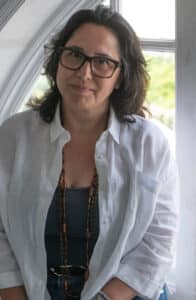Long before my dad lost his optimism and took his own life, he believed that everything was wondrous. It 
With a family that could, on a good day, be described as barking mad and, on a bad day, as riddled with madness (my mother lost her father, her husband and her eldest son to suicide) my interest in mental health ran deep and was longstanding, but with a head for humanities, rather than science, it never crossed my radar as a career option.
Finding my working sweet spot. Then changing it
Following my undergraduate degree in law, I set in pursuit of other interests and found my sweet spot in branding and communications. It soon transpired that I could abide by my father’s philosophy, whilst also creating some stability in my professional and personal life, by becoming the Jack that learns about all trades whilst becoming the master of one. And so it was that fifteen years into a relatively successful branding career, and in conjunction with running the agency that I had founded in 2001, I decided to train to become a psychotherapist – like many in the mental health profession, driven primarily by the wish to mend my own broken parts.
With an appreciation for customer experience (five years of waitressing in a silver service restaurant), creativity and commerciality (20 years of branding and communications), and common sense (the law degree remains useful), it wasn’t long before I could see the multi-faceted shortcomings of the mental health sector, both as a user and supplier of its offerings.
So many questions
Whilst the talk of destigmatisation was gaining traction, with more and more celebrities championing the idea that mental health struggles were “normal” and that reaching out for help shouldn’t feel like a barrier to wellness, the reality of people’s experiences continued to be far removed from the talk. It’s one thing to ask for help, but who do you ask? What do you ask for? How do you know whether you need a psychotherapist, a psychologist or a psychiatrist? What if you have questions about your treatment? What if you don’t like your practitioner? How do you ask for help for your child without labelling them as sick? How do you avoid your child self-labelling as sick? Who do you choose? What are the options?
If you’ve tried to navigate the mental health world, you’re likely to have pondered on any one or more of these questions, as well as countless others. My realisation, therefore, was that therapy itself was less of a challenge than that of navigating one’s way towards it.
Making my vision a reality
With this simple notion in mind, I closed the doors to my branding agency in 2019 and set about to create The Soke, a private mental health centre that would place as much emphasis on the experience around therapy than on the therapy itself. We would ignore the predominant existing model where practitioners were paid by the number of clients they saw and remunerate them according to contracted days. That meant that they wouldn’t have any incentive to hang on to a client that didn’t need therapy or wouldn’t be best suited to work with them.
We would set aside an hour of their day just to talk to each other about clients and cases, making sure that their clients were benefiting not just from their knowledge, but from the experience and expertise of every clinician working at The Soke. We would provide them with professional development opportunities, clinical governance and any other facilities that would make them better practitioners, at no cost to them. All of this would not just ensure an exceptional opportunity for them, but excellence in care for those they looked after.

As for the clients themselves, we would create an environment that felt welcoming and aspirational, immediately removing the sense that they were ‘patients’ seeking intervention for a ‘sickness’. We would provide them with robust client service support, answering all their questions and making sure they were empowered to make informed choices about the options and pathways open to them. This client services team would act as their advocates in any clinical discussions, ensuring that they always have a voice and an opinion that’s heard, acknowledged and deferred to as appropriate.
Growing as demand soars
The Soke was launched in South Kensington on the 5th October 2020, and a few weeks ago, on the 1st June 2023, we launched our second centre in Wimbledon. To say that the demand for our services has been soaring would be an understatement, but I’d like to think that this is not just because there’s a marked increase in mental health issues, but that more and more people – adults and children alike – are prepared to put their hands up and ask for help. My hope is that The Soke is the sort of place that rewards their courage by making the rest of the journey a kind, supported and encouraging one.
In two and a half years, our numbers have gone from four to sixty and, with the opening of Soke Wimbledon, expect to grow at an even more rapid pace over the coming months. Between delivering neurodevelopmental assessments, turning down requests for such assessments (“my six year old keeps getting distracted and fidgeting, I think she has ADHD” – “We can diagnose over the phone that your 6 year old is being a six year old”), seeing more cases of depression and anxiety than I ever thought existed, helping couples find their way back into – or occasionally turn their backs on – their marriage, weaning adolescents off self-destructive behaviours and working with organisations to support their brilliant, focused, hardworking but occasionally awkward neurodiverse employees, no day is the same as the one that went before.
In conclusion, through The Soke, I’ve realised that my dad was right: life is wondrous. Everyone has a story and people are extraordinary. But, unlike my dad – even in their darkest moments – in asking for help, they continue to symbolically raise a glass to hope and optimism.
Written by Maryam Meddin, founder and CEO of The Soke.
Find out about their services HERE
